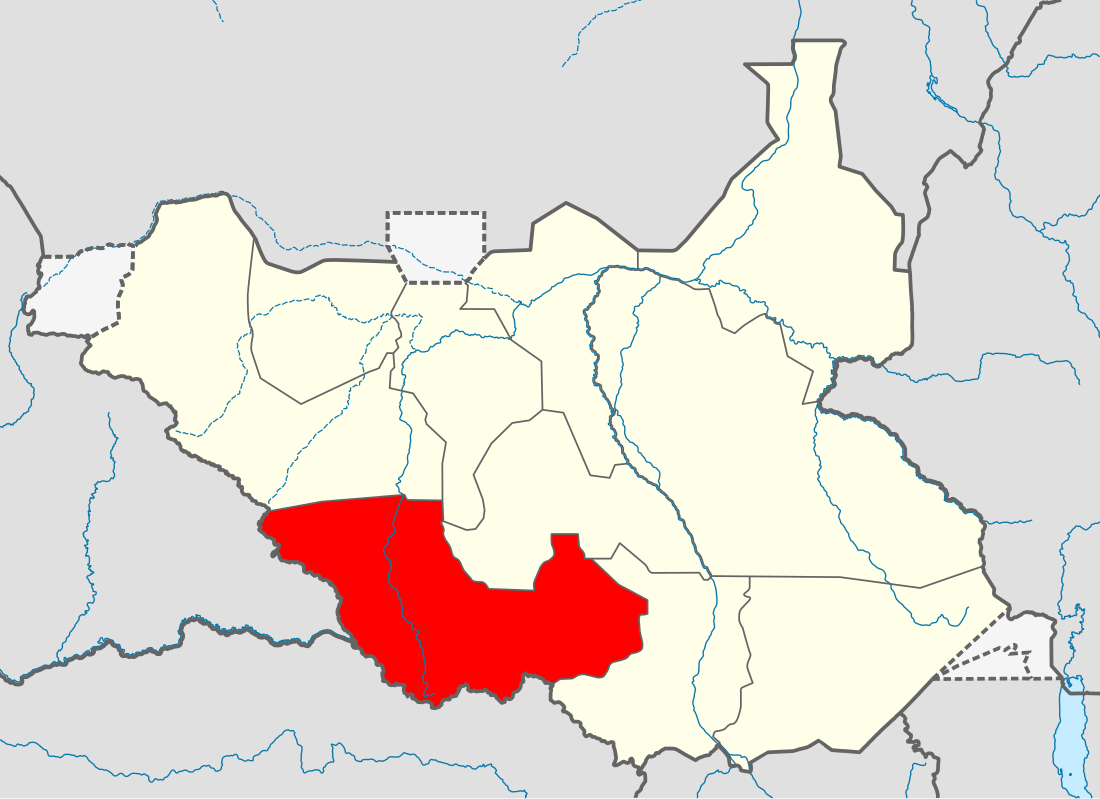Top Qs
Timeline
Chat
Perspective
Western Equatoria
State of South Sudan From Wikipedia, the free encyclopedia
Remove ads
Western Equatoria is a state in South Sudan. It has an area of 79,343 square kilometres (30,635 sq mi). The state capital is Yambio. The state was divided into counties, each headed by a County Commissioner. Western Equatoria seceded from Sudan as part of the Republic of South Sudan on 9 July 1956. On October 2, 2011, the state was divided into Amadi, Maridi, and Gbudwe states, and Tambura State was split from Gbudwe State on 14 January 2015. Western Equatoria was re-established by a peace agreement signed on 22 February 2020.[3]


Remove ads
History
Summarize
Perspective
Since the 16th century, Western Equatoria has been a home to the Avokaya, Azande, Baka, Moru, Mundu, and Balanda.
The Mahdist Revolt of the 1880s destabilized the nascent province, and Equatoria ceased to exist as an Egyptian outpost in 1889. Important settlements in Equatoria included Lado, Gondokoro, Dufile, and Wadelai. European colonial maneuverings in the region came to a head in 1898, when the Fashoda Incident occurred at present-day Kodok; Britain and France almost went to war over the region.[21] In 1947, British hopes to join South Sudan with Uganda, while leaving Western Equatoria as part of Belgian Congo, were dashed by the Juba Conference to unify North and South Sudan.[citation needed]
In the middle of the twentieth century, after Sudan's independence in 1956, Western Equatorians sacrificed their lives for over 5 decades in movements for the independence of South Sudan. This includes the Anya Nya led by Joseph Lagu and the Sudan People's Liberation Army/Movement (SPLA/M), led by John Garang de Mabior, as they envisioned New Sudan. Western Equatoria was also known as the breadbasket state for liberators during both civil wars.
Western Equatoria was separated from its sister state of Eastern Equatoria, becoming a province in 1976,[4] and the two Equatoria provinces were once again inaugurated into 3 statehoods of Western Equatoria, Central Equatoria, and Eastern Equatoria in the midst of the 1990s. Hence, there was a plan to reunify the 3 sister states back into regions after the implementation of South Sudan's federal system. But many suggested the three states should remain in place with each governor, while having a governor general to oversee the Greater Equatoria region.
Remove ads
Counties
There are 10 counties in Western Equatoria:
- Yambio County Capital: Yambio
- Nzara County Capital: Nzara
- Ibba County Capital: Ibba
- Ezo County Capital: Ezo
- Maridi County Capital: Maridi
- Tombura County Capital: Tombura
- Mundri West County Capital: Mundri
- Mvolo County Capital: Mvolo
- Nagero County Capital: Nagero
- Mundri East County Capital: Kedi'ba
Other important towns in Western Equatoria are: Nagero, Duma, Namutina, Jambo, Rasul, Lui, Tore, Muroko, Manguo, Mambe, Kotobi, Yarri, Farak Sika, Madebe, Bangasu, Rimenze, Bazungua, Makpandu, Nadiangere, Kua Diko, Ri-Rangu, Nabiapai, Gangura, Birisi, Ndoromo, Bangazagino, Sangua, Basukangbi Ringasi, Diabio, Yangiri, Ri-Kuangba, Bafuka, Naandi, Andari, Ri-Yubu, Mopai, and Sakure.
Remove ads
Governor of Western Equatoria
- 1976 – 1982: Barnaba Kisanga
- 1982 – 1984: Charles Ali Bilal
- 1984 – 1984: Samuel Abu-John Kabbashi **Lasted 7 days only on first term**
- 1984 – 1985: James Bazia
- 1985 – 1987: Brig. Dominic Kassiano Dombo
- 1987 – 1989: Raphael Zamoi
- 1989 – 1991: Brig. Dominic Dabi Monango
- 1994 – 2005: Due to war in the state, multiple Commissioners/Governors Governed based in Khartoum, Sudan
- 2005: Maj. General Patrick Zamoi (Lasted 6–7 months only on first term)
- 2005 – 2008: Samuel Abu-John Kabbashi (Died in office)
- 2008 – 2010: Jemma Nunu Kumba
- 2010 – 2015: Col. Joseph B. Bakosoro
- 2015: Maj. General Patrick Zamoi (Served until the state was divided into multiple states, then served as Governor of Tombura State until Western Equatoria State was restored back to a single state)
- 2015–2020: (State broken up; 6 successor state governors)
- Since 2020: Maj. General Alfred Futiyo Karaba
Economy and demographics
The economy of Western Equatoria is largely agricultural, with high-quality timber being one of its most important products.
Western Equatoria region is the home of the Moru people, the Zande, Baka, Avukaya, Bari, Bongo, Jur Beli and Jur Mananger tribes.[5]
See also
References
External links
Wikiwand - on
Seamless Wikipedia browsing. On steroids.
Remove ads



